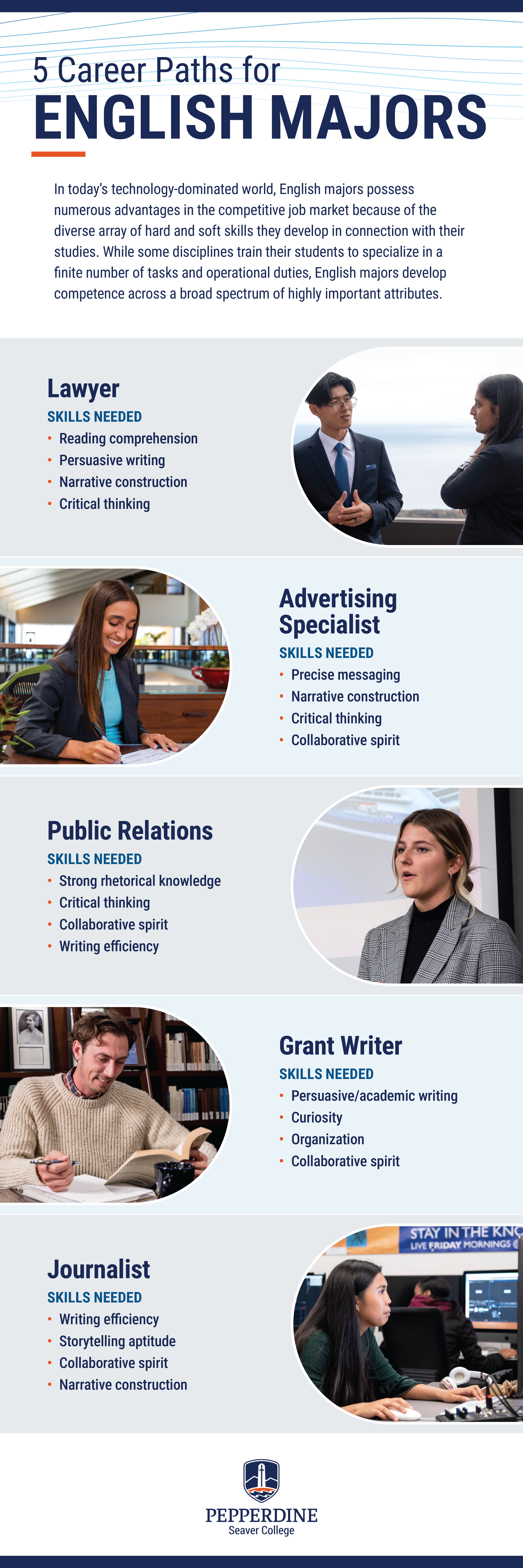Diverse Career Paths for English Majors

Majoring in English literature grants students the opportunity to study ancient and contemporary narratives that illustrate the human condition, and it also provides a variety of exciting career opportunities. As English major graduates engage with the concept of vocation in new and unique ways, they demonstrate the myriad professional avenues open those with a degree in English.
Below, explore the statistical advantages English majors enjoy, a list of five different English major careers, and the distinct opportunities Seaver College fosters through its English program.
The Stats:
In today’s technology-dominated world, English majors possess numerous advantages in the competitive job market because of the diverse array of hard and soft skills they develop in connection with their studies. While some disciplines train their students to specialize in a finite number of tasks and operational duties, English majors develop competence across a broad spectrum of highly important attributes.
Skillful reading, writing, and critical thinking serve as the foundation for a number of English major careers. Additionally, English graduates’ power to develop persuasive arguments; create impactful narratives; and appeal to people’s reason, emotions, and trust in their authority; make those carrying a bachelor’s degree in English literature exciting and highly desirable regarded candidates.
Seaver College’s English graduates illustrate these concepts
Ninety-one percent of Seaver College’s class of 2022 English majors were either employed or accepted to graduate schools immediately following the completion of their undergraduate degree. Fifty-five percent of these students immediately joined the workforce, while 36 percent furthered their studies at graduate schools such as the University of Chicago and the University of Madison-Wisconsin.
Nationally, this trend is accentuated even further. The US Bureau of Labor Statistics estimates that the top occupations of English majors will grow anywhere from 5 percent to 24 percent during the next seven years.
English major careers
Given the coming vocational boom for English majors, five unique careers to consider include.
1. Lawyer
Skills needed:
- Reading comprehension
- Persuasive writing
- Narrative construction
- Critical thinking
The skills English majors develop throughout their coursework make them ideal law school candidates. While becoming a lawyer might seem, at first glance, detached from the world of words, English majors possess the needed skills to pass the bar.
Reading and writing are the cornerstone of any law school education. Lawyers must possess the ability to consume, comprehend, and articulate large amounts of informationt in order to perform their job well. Similarly, a lawyer must be able to communicate with the written word in an effective manner.
A degree in English literature naturally develops both of these crucial skills within its curriculum. Moreovert, studying and observing how narratives are constructed inform a lawyer's ability to craft convincing arguments within the court of law.
While the stories and readings filling an English literature syllabus could appear impractical in a world concerned with hard data and innovation, they ultimately help inform the global cause of justice and as a result, they provide a strong background for an attorney.
2. Advertisement Specialist
Skills needed:
- Precise messaging
- Narrative construction
- Critical thinking
- Collaborative spirit
The world of advertisement revolves around narrative. How can this product become the hero of a story? How can we illustrate its positive qualities in an engaging way? Accordingly, English majors are naturally strong candidates to step into the world of marketing.
As a student of literature, one begins to grasp that every detail of a well-crafted story has meaning. The same is true for all the large advertising campaigns we see scattered across billboards, social media sites, and TV commercials. From the text, to the colors, to the precise mise en scène of the moment, advertisement is about intentional messaging.
English majors, with their sharp critical eye, attention to detail, and acute ability to communicate, possess all the needed skills to contribute to the advertising sector.
3. Public Relations
Skills needed:
- Strong rhetorical knowledge
- Critical thinking
- Collaborative spirit
- Writing efficiency
The art of public relations relies on a foundation of rhetoric. A public relations specialist must possess the ability to comprehend brand values and create promotional content demonstrative of those ideals. In order to accomplish this goal, one must be willing to collaborate with others, draft content efficiently, and choose words with care.
English majors are strong public relations candidates because of their focus on words and themes. By understanding how and why a text conveys a specific message, an English major acquires the ability to use language with deftness, honing in on meanings in a precise and advantageous manner. Through their extensive engagement with the writing process, English majors understand the nature and value of collaboration.
4. Grant Writer
Skills needed:
- Persuasive/academic writing
- Curiosity
- Organization
- Collaborative spirit
Grant writers provide crucial assistance across a broad spectrum of industries. A grant writer must have the ability to comprehend whatever project they are assigned and distill its key points in a compelling and comprehensive manner. They collaborate directly with key stakeholders, supporting and promoting the precise needs of their venture.
English majors make for excellent grant writers given their strong reading comprehension and writing abilities. They have the adaptability necessary to juggle a multitude of subjects at a single time, weaving them together into a single, neat whole. In addition, English majors’ significant curiosity about all facets of our world make them engaged grant writers, as projects vary in subject matter and discipline.
5. Journalist
Skills needed:
- Writing efficiency
- Strong sense of story
- Collaborative spirit
- Narrative construction
Journalism is one of the most powerful and important professions today. Modern technology has helped create a 24-hour, global news cycle in which current events from around the world are delivered instantaneously to our pockets. As a result, the need for accurate and honest reporting has never been stronger. This is where journalists come in.
A journalist is required to identify, investigate, and draft informative content for the public to read and comprehend. Their job is equal parts reporter and storyteller, as they must tell factual, engaging tales that cut to the core of specific subjects. A journalist must possess the ability to write often and quickly ; they must also be strong collaborators as they go about interviewing others and editing their work. These qualifications correlate with an English major’s skill set.
English majors grow accustomed to the habit of drafting engaging yet informative texts in the midst of their studies. Whether they are creating a persuasive essay or a research paper, writing dominates their curriculum. English majors should enter the professional world with a strong sense of what exactly constitutes a compelling story, based on their years of studying classical and contemporary texts.

English major opportunities at Seaver College:
Seaver College provides its students with a four-year, liberal arts education meant to enhance and engage their ability to critically think about a diverse array of topics. In the process, the institution hopes to equip its attendees with the ability to confront the obstacles of today with thoughtful consideration, deep insight, and actionable ideas. One key part of this education is found in the tradition of English literature.
Seaver College’s English major has three potential tracts, including an emphasis in education, an emphasis in literature, and an emphasis in writing and rhetoric. The program aims to cultivate the skills of rhetorical analysis, compositional competence, critical thinking, investigative research, and public speaking. In the process, students will learn to apply a spiritual, moral, and ethical perspective to a given text.